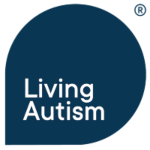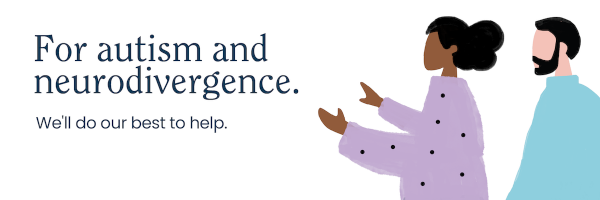Membership review for The Meadows@GS Social Care
By Craig Godding – Date of visit: 21/11/2016
|
The membership review is intended to reflect the experiences of the visitor who might be looking for a placement. The review is subjective, consistent and impartial, representing the impressions of our team member on the day of the visit. It is a snapshot view only. The contents of this review are intended to cover some of the subjects and issues which an individual, their relatives or their placement officer might ask. This review has been published with the written agreement of the home owner, or an authorised representative of the company.
‘It was clear that a great deal of thought had been given to the internal environment at The Meadows. There were two bedrooms, one room was equipped with a ‘safespace’ bed which had the ability to be completely enclosed thus limiting extraneous sensory input. The other bedroom had more traditional furniture although the environment remained minimal and functional, wardrobes and drawers were robust and affixed to wall/floor.’ |
Summary of findings
I was very impressed by the environment at The Meadows and the apparent overall professionalism in the approach of the organisation GS Social Care. There was a real clarity of purpose expressed by the staff I met in terms of how the services were run and for whom. I did not meet any individuals availing themselves of The Meadows respite unit during the visit or observe any practice; this review was based purely on a visit to the respite provision, an observation of environment and discussions with staff members Naomi Grime, Business Administration Officer, and Emma Young, Care Co-ordinator, for The Meadows and reading documents over a three hour period.
Introduction
GS Social Care Solutions has been established since 2006. Although the organisation works with any vulnerable client group there was a developing specialisation in terms of autism. The visit was to review The Meadows, a recently registered, specifically designed respite unit for those aged 0-25. It was primarily open to those on the Autistic spectrum who may/may not present with behaviours which challenge. I also looked at GS Social Care’s domiciliary and community support scheme which reaches out to autistic clients of varying ages.
Understanding Autism
Naomi stated that autism training forms a significant part of the induction process for new staff. She went on to say that the company directors and Registered Manager had a real interest in autism and very much wanted to develop the specialism. Naomi estimated that 80% of the children and adults GS Social Care and The Meadows were supporting were diagnosed or were likely to have an autistic spectrum condition. All senior staff were trained in Makaton and there was clear evidence of ‘Picture Exchange’ availability and ‘Now and Next’ boards. Individuals were asked to give feedback on whether they had enjoyed their stay and this included an opportunity to do so using PECS if that was appropriate.
If individuals experienced periods of extreme anxiety or distress the policy was to redirect to individuals to designated areas to calm and that might just be the person’s bedroom. All individuals supported by The Meadows and GS Social Care had a one page behaviour profile and a ‘my six steps’ guide.
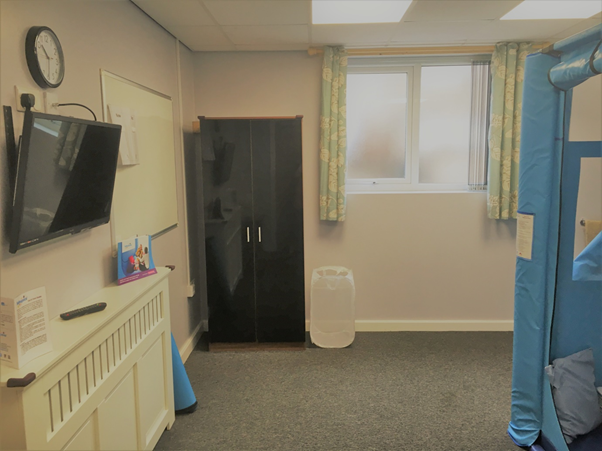
The Environment
It was clear that a great deal of thought had been given to the internal environment at The Meadows. There were two bedrooms, one room was equipped with a ‘safespace’ bed which had the ability to be completely enclosed thus limiting extraneous sensory input. The other bedroom had more traditional furniture although the environment remained minimal and functional, wardrobes and drawers were robust and affixed to wall/floor. There was a small, but quite well equipped sensory room which allowed for sound and lighting to be easily controlled by the person using the room at the time.
The main living area incorporated both seating and a small kitchen although there was also a larger kitchen and eating area at the other side of the building. This was helpful if an individual did not like eating their meals at the same time or in the presence of peers.
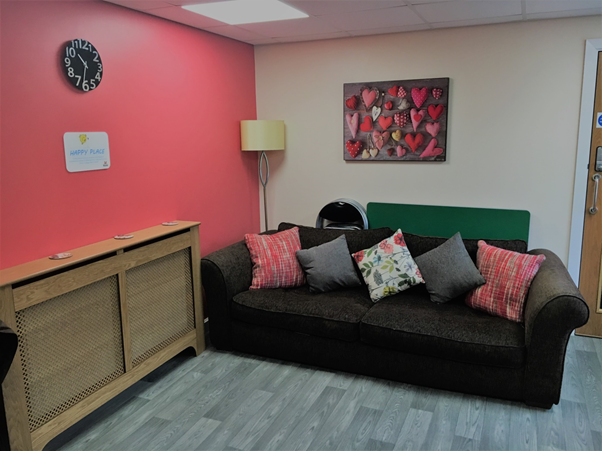
Individuals using The Meadows and some young people who were supported by GS Social Care in the community could make use of the large hall which was full of different play and sensory equipment and potentially join in planned activities, depending on timings, put on by Elysium who are the charity wing of GS Social Care.
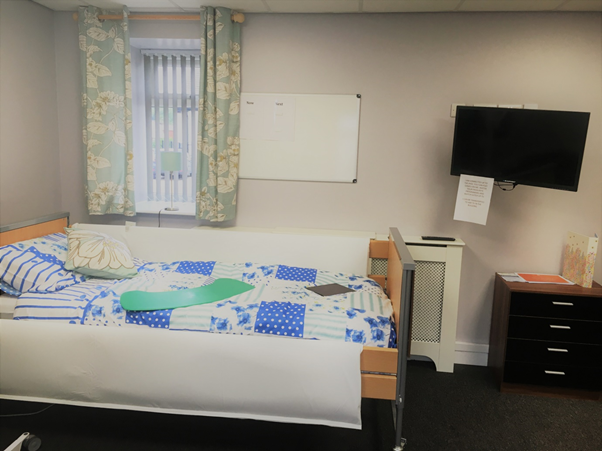
Naomi stated that there were plans to develop the outside space. The area had already been tastefully fenced off. There was outdoor lighting available and an old air raid shelter was used for storing bicycles and other outdoor equipment. There was no nearby traffic concern, the service being very much tucked away and felubg quite private.
GS offices and The Meadows are within easy reach of Great Harwood town centre and there is a bus stop within easy walking distance allowing travel to Blackburn and Accrington.
Individuals staying in the home
There was nobody in the respite service at the time of my visit. Naomi explained that at the present time the respite service was only offering a service at week-ends and school holidays however, that would be shortly increasing to include week days too Monday-Friday 4pm until 8am.
There was opportunity for individuals to bring their own belongings; anything valuable could be locked away in a cabinet.
The Individuals so far that have stayed at The Meadows have generally not had capacity to manage their own money, although there have been exceptions who were supported to do so.
There are social group ‘get-togethers’ of individuals supported by the outreach teams several times a year and there had been a recent trip to see Blackpool illuminations.
The majority of individuals who had stayed at the Meadows thus far had autism and additional needs.
The transition into the respite service at The Meadows involved up to 4 visits for an evening meal just to get them used to the surroundings.
Payments for activities individuals may want to access can be incorporated into the overall invoice.
Naomi stated that support workers were matched to personalities of individuals.
In terms of individuals supported by the domiciliary and community support teams, 80% are children and young people and the packages of support and care vary considerably although packages of less than an hour are not considered by GS.
Health and Wellbeing
All staff receive medication training and the majority have been instructed regarding Buccal Midazolam administration and ventilation.
Appropriate places for Medication storage were observed.
All staff are MAPA trained (Management of Actual or Potential Aggression)
Personal care is also provided both by Meadows staff and those working in the community. Protective equipment was seen to be available.
Staffing
There were Staff pictures up on the wall and an indicator of who was on shift and going to be on next shift. There was a signing in book at reception for staff and visitors.
In terms of the Meadows staff there were 2 permanent staff and additional experienced staff were brought in when required from the GS Social Care Domiciliary and Community Floating Support teams. Naomi said there had been no problem at all in terms of staff being available to work at The Meadows. Staff needed to have a minimum of GCSE level qualifications to apply for any GS support posts, most staff had got or were working toward NVQ level 3.
GS Care Co-ordinators – Lucy, Louisa, Jackie and Alison all undertake assessments and care plans with the clients/families. If relevant Rebecca, the senior care coordinator, will go out specifically for a moving and handling assessment as she has specific expertise in that area.
GS operate a 24 hour on call facility.
Staff members use their own vehicles for work purposes and all have business insurance. I read through the lone working policy for GS, which is particularly important.
Several staff had other significant relevant qualifications.
All new staff members received an induction pack and all staff received mandatory training in safeguarding, first aid, moving and handling, a full day’s autism awareness training and 2 days on Management of Actual or Potential Aggression. There were also continuous training modules available online. There was a company Intranet available to staff to allow consultation with policies and procedures and to access online training.
Management of the service
Overall management of the service was undertaken by Dorothy Gould, the Registered Manager. She has worked with children and families in a variety of settings since 1995. The qualifications gained are NVQ 4 Advice and Guidance, Access to Management and Dorothy has also completed her NVQ 4 Registered Managers Award (RMA). Dorothy has experience of working within the following establishments: the Jobcentre, Connexions, Project Manager within schools, Training Co-ordinator – working within a homeless hostel and as a Deputy Manager in a Residential Children’s Home.
Assessments of potential future clients at The Meadows were undertaken by Emma Young.
The Living Autism review does not look at individual records so I could not say how prevalent physical intervention was.
Staff had a shift handover list where key information was passed over.
Policies and procedures were seen to be available to view in binders in the office.
Several different brochures and leaflets were readily available at the GS Social Care reception.
I read through the statement of purpose for the Meadows and had no concerns; everything included was relevant.
In terms of the outreach service there is an on call number for families or individuals to call if the support person does not arrive for whatever reason. GS operate a ‘key-safe’ system in many care packages, so if a member of staff cannot gain entry to an individual’s property and they are concerned this allows them to access.
Conclusion
Overall my feeling was that GS Social Care had all the hallmarks of a very professional and experienced service. The set up at the Meadows was very impressive and little expense had been spared in terms of provision of appropriate equipment. There are plans to further develop this part of the service with the outside space being developed also. In terms of the outreach and domiciliary element of the service the procedures in place seem robust and as I stated within the report I felt there appears to be a clear vision as to whom the service is aimed at, we look forward to working with GS over the coming years.
Visiting Officer - Craig Godding
Operations Director
Living Autism
